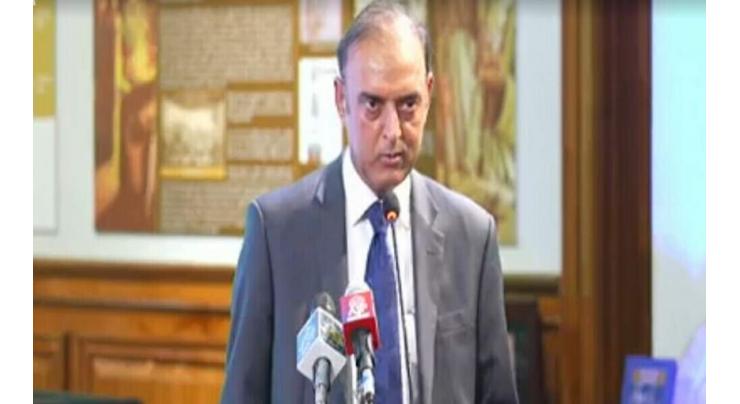
- Home
- Business
- News
- Prudent policies, reforms poised to result in sustainable economic growth: Governor State Bank of Pa ..
Prudent Policies, Reforms Poised To Result In Sustainable Economic Growth: Governor State Bank Of Pakistan (SBP) Jameel Ahmed
Sumaira FH Published April 18, 2024 | 08:04 PM

Governor State Bank of Pakistan (SBP) Jameel Ahmed highlighting country's substantial improvements in macroeconomic outlook hoped that time bound reforms will put the economy on the path of sustainable economic growth
KARACHI, (UrduPoint / Pakistan Point News - 18th Apr, 2024) Governor State Bank of Pakistan (SBP) Jameel Ahmed highlighting country's substantial improvements in macroeconomic outlook hoped that time bound reforms will put the economy on the path of sustainable economic growth.
Governor SBP expressed the views during his meetings with key international investors during multiple events organized by leading global banks and financial firms, including JP Morgan, Citibank and Jefferies, on the sidelines of the IMF-World Bank Spring Meetings in Washington DC, said a statement issued here.
He informed the participants about the substantial improvement in Pakistan’s macroeconomic outlook achieved over the past year as a result of a prudent monetary policy, backed adequately by fiscal consolidation and beginning of the implementation of key structural reforms.
Governor referring to sharp decline in inflation over the past year from a peak of 38 percent in May 2023 to the two-year low of 20.7 percent in March 2024 explained that the deceleration in inflation is broad-based, reflecting the combined impact of monetary tightening, fiscal consolidation, ease in import supplies, improved agriculture output and base effect.
“More importantly, core inflation declined markedly, reaching 15.7 percent in March, after persistently staying above 20 percent throughout last year,” he added.
The governor informed the participants that the external sector has also stabilized, as reflected in the sharp reduction in the current account deficit (CAD) to $1 billion during Jul-Feb FY24 from $3.8 billion in the same period last year.
In addition to stabilization policies, improved agriculture output has contributed to higher food exports, while lowering the import demand of agri commodities like wheat and cotton, he stated adding that workers’ remittances have risen consistently since October 2023 on yearly basis, driven by incentives and regulatory measures to divert inflows towards formal channels.
These qualitative improvements in the external account have allowed the SBP to more than double its FX reserves from January 2023 ($3.1 billion) to around $8 billion on 12 April 2024 despite the repayment of a $1 billion Eurobond on the same day, Mr. Ahmed mentioned and added that at the same time, the SBP’s forward liabilities have also reduced significantly from $5.7 billion in January 2023 to $ 3.4 billion in February 2024.
Governor SBP stressed upon the improvement in the country’s external debt dynamics, with a reduction in the gross financing requirements due to sizable CAD contraction. Moreover, he noted that the maturity profile of external debt has also improved, with share of relatively costly short-term commercial loans declining while the share of long term concessional financing from multilateral agencies, coupled with support from bilateral partners, is rising.
Mr. Ahmad also noted a recent pickup in inflows from overseas Pakistanis via Roshan Digital Accounts and also by other foreign investors, on the back of strong performance in achieving the targets and benchmarks under the IMF SBA program.
He said that government was hopeful of signing a long term IMF program, which will facilitate additional external financing and the adoption of structural reforms to deal with longstanding issues in the economy.
Governor also highlighted SBP’s efforts to provide a conducive macroeconomic environment for the private sector to invest in the economy as the SBP’s Strategic Plan 2028 aims to facilitate growth by achieving price and financial stability.
The governor highlighted the widespread adoption of digital technologies to address gaps in access to financial services and to revolutionize the domestic payments system and hoped that these time-bound reforms are expected to put the economy on the path of sustainable economic growth.
Related Topics
Recent Stories

Cricket: England v West Indies 3rd Test scoreboard

Finance minister briefs Chinese officials on reform agenda, engagement with IMF

Finland says Russian vessel violated its territorial waters

Olympic opening ceremony under way on River Seine

West Indies' treble strike rocks England in third Test

Ukraine court orders detention of suspect in murder of nationalist ex-MP

Long queues, ticketing problems ahead of Paris opening ceremony

Rana Sanaullah Khan joins Paris 2024 Olympics inauguration reception

Glowing tributes mark 69th birthday of President Zardari at Governor's House

Players unaware of spying scandal as Canada Olympic coach sent home: official

Naqvi hails Pak women cricketers for going down fighting against SL

'Sabotage' on French rail network before Olympics: What we know
More Stories From Business
-

Finance minister briefs Chinese officials on reform agenda, engagement with IMF
7 hours ago -

Chinese support for CPEC, development projects show deep love with Pakistan: Mushahid
7 hours ago -

G20 seeks common ground on taxing super-rich
7 hours ago -

Stocks rise as inflation data boosts rate cut hopes
7 hours ago -

Land of PSM to be used for establishment of SEZs: NA body told
10 hours ago -

European medicines watchdog rejects new Alzheimer's drug
10 hours ago
-

FBR committed to resolve taxpayer issues in KP, Chairman FBR assures Governor KP
11 hours ago -

Tanveer emphasizes role of SEZs in attracting investment
11 hours ago -

Russian central bank hikes key rate to fight inflation
11 hours ago -

SBP injects Rs9.545 trillion into market
11 hours ago -

PSX stays bearish, loses 439 points
12 hours ago -

US Fed's favored inflation measure cools further in June
13 hours ago

















